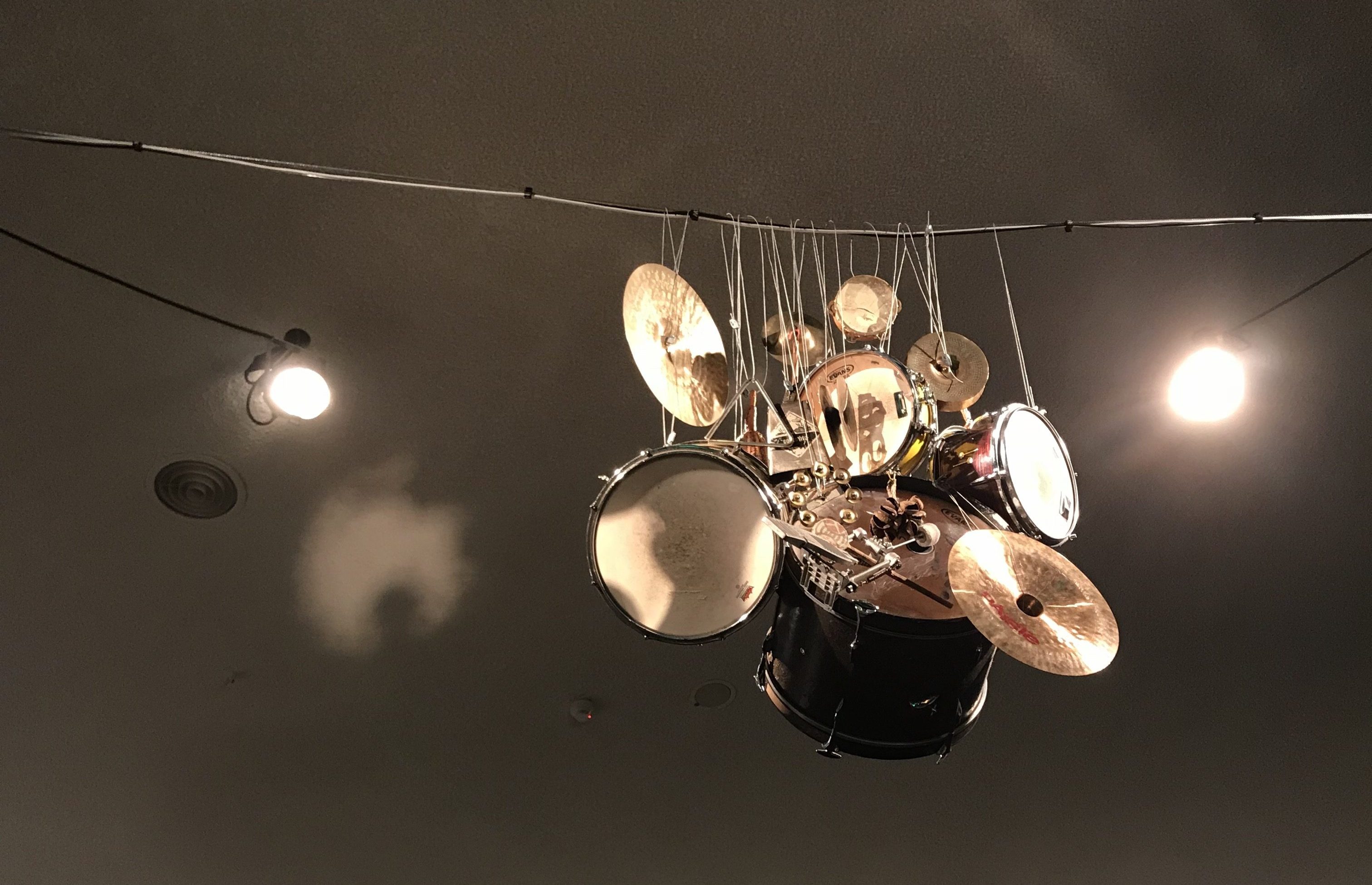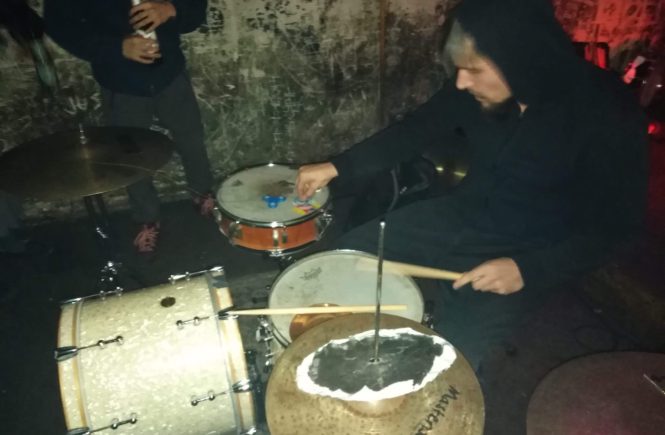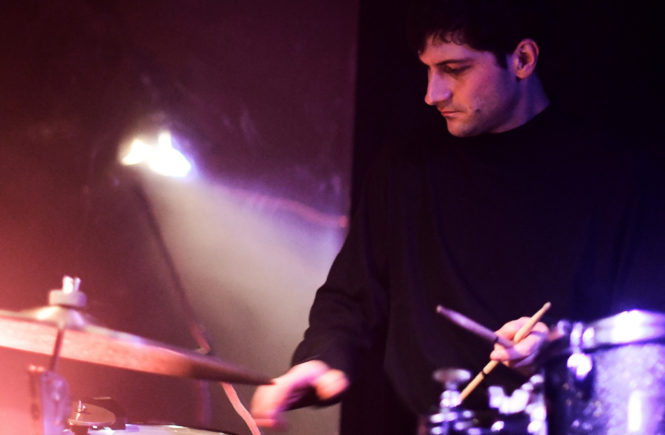



The narrow sidewalks on Gouraud street are every now and then blocked by either a jungle of scaffolding or some ambitiously parked vehicle, plastic chairs and lounging shop keepers. This chic street in the Gemmayzeh sector of Beirut, is just a free way across from the port, where the infamous explosion of 2020 devastated the city, and many buildings are still under restoration or left neglected. As I stumble to navigate through the busy traffic and local customs, ‘Which part/side of the road am I supposed to walk on?’, I ask Ibrahim Owais, founder of Recordat and one-part of Radio Alhara, the communal radio station from Palestine. ‘There are no rules,’ he laughs, and we walk and weave on further until Gouraud turns into Armenia Street. As soon as we make a turn leaving the bustling Armenia street lined with loud bars, into the Geitawi residential neighborhood, there’s a darkness I’m not used to (Beirut has gone off-grid since the power plant failed to procure oil, private back-up generators and solar panels make up for the essentials), and I’m feeling the comfort of being accompanied by my travel companions, the Recordat tour crew. Owais has brought with him Elvin Brandhi a frequenter of the Beirut underground scene, 3Phaz from Cairo, Iranian photographer Niloofar Asghary, and soon to join the traveling band is Berlin based experimental sound artist and dj Sara Persico originally from Naples. We are headed to Riwaq Beirut where Owais is music selector for the night.
Riwaq appears to be a favored joint for music lovers, standing on a quiet residential Y-junction, a sign on the window reads ‘please ask for plastic cups when sitting on the stairs,’ alongside a mosaic of stickers. As the night deepens the bar flies start to seep out into the streets and onto the stairs at the junction, many hugs are exchanged. Aside from dj sets, the cozy joint offers everything from Espresso Martinis to Batata Harra (spicy potatoes) and the occasional live act like a trio session by Paed Conca, Anthony Sahyoun and Akram Hajj, which was held earlier the same month. The music scene seems to be tightly knit and one can observe a vivid connection within the Levant region (and also to my delight Berlin as well). Musicians from Egypt, Palestine, and local Lebanese flock the bill as I check out the music programs during my stay. My travel companions must focus on their own appearances, two club nights, and an improvised live set at Bar Anise for Brandhi and Persico, but I’m determined to check out as many places as possible.
The capital city of 2.4 million inhabitants houses a handful of cozy joints offering live music regularly. Salon Beyrouth was a beautiful airy restaurant housing two full grown trees and a classy bar under their roof, where I saw the local band Cool Drive playing funk covers from the likes of Joe Sample and The Crusaders. The drummer of this band Walid Tawil, as it turns out to be, is father of Teddy Tawil aka TEDTEDTED, multi-instrumentalist and close collaborator of Kinematik (Rudy Ghafari, Akram Hajj, Roy Khazen and Anthony Sahyoun), which is also a must-hear post/experimental-rock outfit from Beirut. Now Beirut was closed on the night I planned a visit for an oriental-infused funk trio, technical difficulties were the reason, perhaps a power failure? More to be said about the electricity grid layers later.
Bar Anise hosted the improvised live session of Elvin Brandhi and Omar Itani, with Sara Persico as special guest. Itani on a vintage soviet analog synth, and an electrified Brandhi (metaphorically and literally, as some weird circuit between her Voicetone pitch pedal and the stone floor electrocuted her), is later joined by Persico also on mic and Kaossilator. Itani’s soviet synth creates an underlying mechanical drive, and Brandhi’s dexterous sample manipulations, free style shouts & lyrics set the mood. Persico’s main instrument is her voice, which is ethereal and sensual, like honey, but the very dark type. I believe this is the premier of a collaboration between Brandhi and Persico for an audience, but a few days earlier I was fortunate enough to hear them vocalizing together, playing with the reverbs of an old, abandoned synagogue. It felt like a historic moment, as the two really speak to each other in complementing frequencies. The bar is packed on this Wednesday evening, and as I sit on the cold stone floor in front of the performers, another enthusiastic ear joins to take the impromptu front-seat next to me. I don’t know this person, but I feel like we are already friends. Block letters above the stage reads “Don’t stop talking about Palestine.”
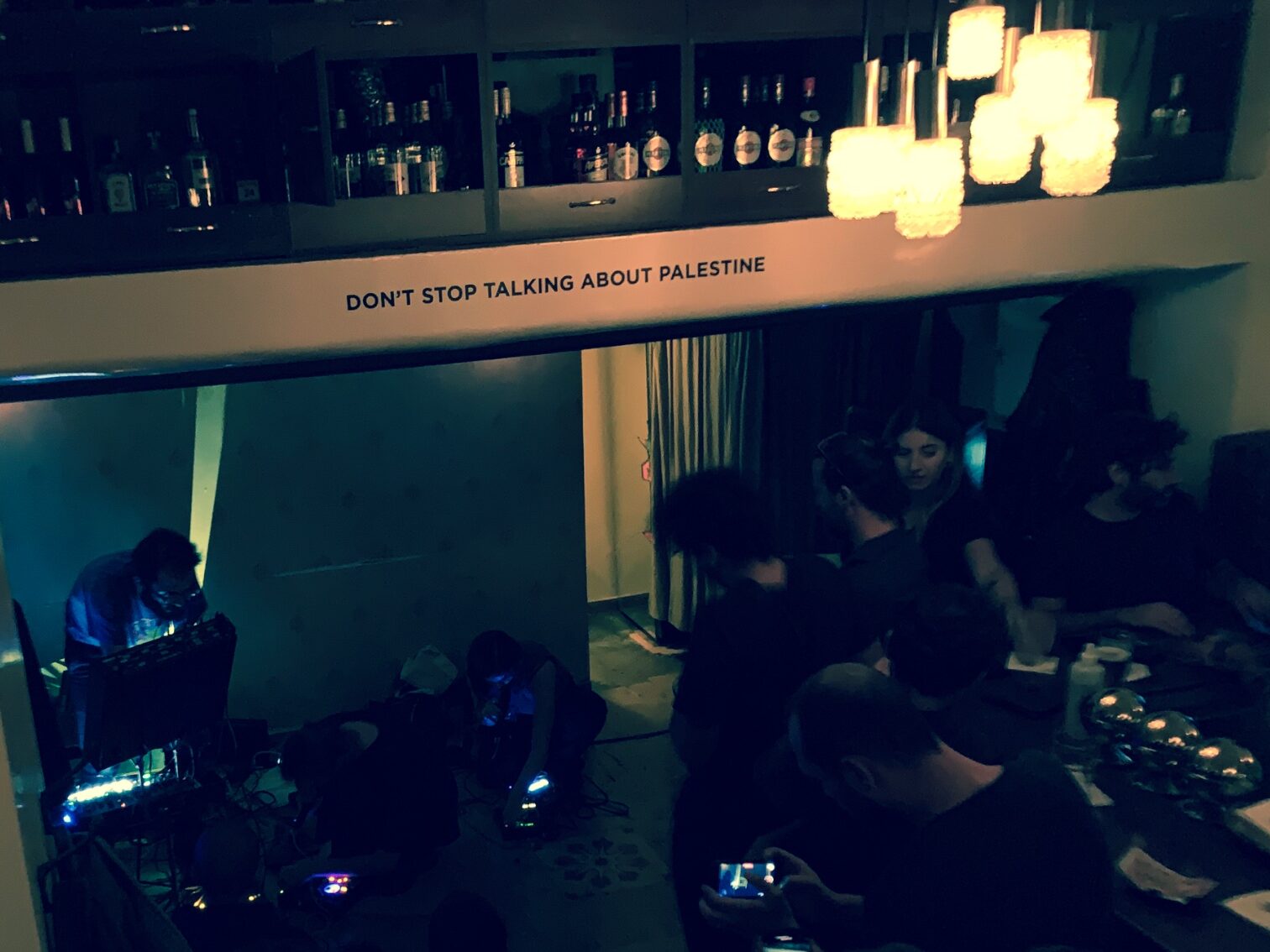
At Metro al Medina, I was recommended to see the “Hishik Bishik Show,” a cabaret style spectacle taking the audience back to the early 1900s golden age of Egyptian wedding music, but by a slight chance missed all the dates. Instead, I witness Achkara: The improvisational unit of Faraj Hanna, Khaled Yassine and Khaled Omran. Hanna is established as a singer on the pop spectrum, but on the Buzuq – a long necked 3 string instrument with movable frets (in contrast to the Oud which has a shorter neck and no fret), he is a serious soloist, hitting the chords and souls heavy. On a recent Instagram post Hanna writes, “After a full year of continuous practice, we got out to the speed of the world for the first time, and the goal was to create an improvisational group performance with musical molds derived from our people and folk music and from our own inventory. What we did this year (Khaled Yassine, Khaled Omran and me) is to strengthen our relationship with each other on the human and musical levels so that we can improvise in the spirit of unity. […] This project is currently my main project and for the first time I feel like I am part of a musical project that is so special and near to me after years of research, flapping north and right and continuous experiments. This time I feel that I took the first step on the road I would like to walk” (Translated from Arabic).
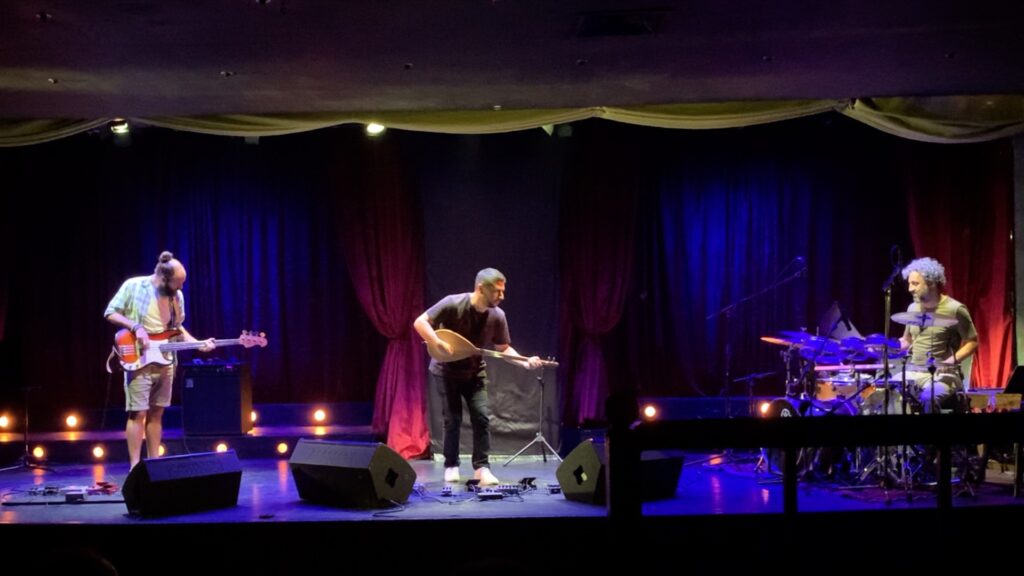
On this night at the Metro Al Medina, drummer Khaled Yassine grabs my heart when he creates a tantalizing groove just with the drumsticks hitting each other (stick clicks), such an artful quiet yet exciting solo moment. These slick moments and in contrast the powerful walls of sounds pushed the dynamic of the entire performance to a monumental celebration on the dancefloor. The self-taught percussionist explores rhythmic ideas from jazz, Arabic traditional, drum n’ bass, etc., where for a flash of a second his curly gray hair and fast precise beat work reminds me of Jojo Mayer. It is such a jam to dance to Achkara’s music with the funky audience, it’s like a psychedelic rock concert, but here man and woman alike groove with the raqs sharqi (oriental dance) leg work and sensual arms, hips and palms and fingers.
Other projects that Yassine is involved in leans more into the modern and leftfield corners, such as Malayeen (with Raed Yassin and Charbel Haber) that interprets and updates works of Egyptian guitarist Omar Khorshid, or Alif – a collaboration of musicians in Beirut and Cairo and inspired by avant-garde poetry (consisting of Tamer Abu Ghazaleh – Vocals & Buzuq, Khyam Allami – Oud, Maurice Louca – Keys & Electronics, Bashar Farran – Bass, and Khaled Yassine – Drums & Percussion). To the biggest delight, after my return to Berlin I catch a performance of Mr. Yassine in Saet El-Hazz (The Luck Hour) featuring “A” Trio, at the Morphine Raum. This was a performance of compositions by Maurice Louca, with Mazen Kerbaj on prepared Trumpets, Sharif Sehnaoui on prepared Guitar (the former two making up the co-founders of Irjital, the most important festival for experimental music and longest running music festival in Lebanon), Raed Yassin on prepared Bass, Biliana Voutchkova with Violin and Voice, and of course Khaled Yassine playing a special Saari Drum set (hand made wooden drums from Finland), gamelan, and Darbuka.
I later learn that these collaborations require more effort to it apart from making the geographic leap, as ‘imposed borders’ between many of the Arab nations levy visas and permits to their citizens, for example, to enter Syria a muddling security clearance process is required, Palestine is a no-go zone for Lebanese, Jordanians, Egyptians and vice versa, and to enter Egypt a visa must be obtained.
What makes up for the closed borders are the fact that, for better or for worse, that due to half a century of war, political and economic instability, the majority of the Lebanese population lives now outside of the country. Fluid are the borders of a nation when it comes to the people and their culture, one can imagine a greater Lebanon when we focus our lenses on the vast many who live outside of the politically drawn lines. Musicians to the likes of Mazen Kerbaj, Tony Elieh, or Rabih Beaini (conspirator of Morphine Records and Morphine Raum), all based in Berlin, create an annex of sorts of the nation through their fields of operation.
As Joseph Junior Sfeir better known as june as – co-founder of the Beirut collective Frequent Defect that runs the Mkalles Warehouse, puts it, “despite this very weird thing that it’s so hard for people to travel between Arab countries, there exists a spirit of connections, it’s relatively straightforward to find who in the region is pushing along the lines regarding music. Many of the connections were made by meeting people along the way and putting other people in contact, spreading trails here and there, whether the first encounters were virtual or not.” This was exactly how june as met Ibrahim Owais – the Jordan born Palestinian now based in Berlin, for the first time, after Owais approached june as online to record a mix for Recordat on Radio Alhara in 2020, the two later uniting in person in Greece and Berlin. This time, Frequent Defect has invited Recordat to collaborate for their event Grime and Punishment hosted at the collective’s main venue Mkalles Warehouse.
Frequent Defect was founded by june as, Patrik Abi Abdallah (h.w.g.a. or He Who Goes Anywhere) and Renata (who also performs under her moniker kamera these days), having started with a few events at the now missed Yukunkun club located in Gemmayzeh and other pop-up locations in and around Beirut. In 2017 they took over an abandoned warehouse in the Mkalles’ industrial district on the outskirts Beirut, renovating rooms floor by floor to accommodate the growing collective of sound and visual artists. The Mkalles Warehouse is now a host to several types of events the collective organizes or hosts, from club events to art exhibitions, theater, and poetry readings. Although the warehouse is almost inaccessible without a car, and despite the lack of public transportation in Beirut, a few hundred music lovers make it to the remote block whenever an event is announced, mostly through word of mouth and direct communication. The music here satisfies the ears of a plethora of sound enthusiasts. For example, the event Grime and Punishment invites acts leaning towards urban borne genres like grime, UK-garage, hip-hop, trap, UK-bass, dubstep, footwork and juke. 10 Hymns for Corrosion is dedicated to post-punk and new wave, dark wave, ebm or new beat. And Frequent Defect is the collective organizing all the above, but also the title for their flagship club event, where “we don’t really talk about genres, because it’s more about whatever the artists are up to at the moment in terms of pushing boundaries,” explains june as.
Instead, each edition of the Frequent Defect series is captioned with a subtitle and abstract text that encapsulates the collective’s current apprehensions or sentiment towards the issues at hand. “Forced Compliance” “Exposed Intents” are some of the few recent themes. As june as puts it, “it’s an anthology in a sense, I would say, of what we’re feeling while going through this. It started off with socio-political topics from the Shell Shock Syndrome or ptsd. Or topics like how dissent is always contained, you can go protest, but you’re always contained. Another for example was about defense mechanisms as a general theme, and in each edition, we were trying to analyze and discuss different defense mechanisms. Not necessarily in an academic or analytical way, but also more in a sense of consciously being in this environment and noting what thoughts are triggered at each point in time, not just to adapt and go with things. Instead of just taking it as it is, having an analytical eye as a response to what’s going on. ” Sometimes the words can become too abstract, june as admits, as the intent is not to make a clear statement but rather to invite a discussion.
Before this topic, june as was telling me, how the Lebanese people are by now, used to adapting to new realities all the time, adjusting to new inconveniences and dealing with crisis. It’s truly astonishing how resilient* the people are here, and the city is bustling. I tell him, that it feels quite ‘normal’ to be here, to which he responds: “Maybe six months ago or a year ago, I don’t think you would’ve felt this normal situation from the people here. There was a period where everyone was in a desolate state, it was apocalyptic in a sense. But then, weirdly enough, and as has been happening in Lebanon since I can remember, you always find that people, after a certain while they readapted, they readjusted to the new situation. In the past few months, there was this feeling of, okay, things are really bad, things are going downhill, but we’re not just gonna stay there torturing ourselves. Everyone started looking for ways to work within such an environment. Definitely it does feel that the spirit in the past few months has changed among people.” Resilience is one thing, and acceptance in defeat is another. By encapsulating these moments in time, like a time-capsule, by means of words or creating music, a collective empowerment is attempted. (Also the aim of my writing, and speaking of time capsules, Sara Persico encapsulated her take on the Recordat Beirut tour in this mix aired on Athens based online radio Movement Radio shortly after the trip.)
*Note: “The topic of resilience has been subject to debate for a while now here, as there is an image that’s being sold to people that yes we are resilient and all, but which is used as a sort of tool against the people to make everyone accept or mask the reality of going downhill. Though this resilience is very well and clearly present, it is oftentimes used as a weapon against the will of the people,” warns june as.
I got to experience a night of Grime and Punishment at Mkalles, where Owais, Elvin Brandhi (live), and 3Phaz joined the bill with local act Al Asli (live), mocques, kamera and june as. Al Asli is a rapper from Syria, who raps lyrics in Arabic on top of abstract beats. Such a shame that I don’t understand Arabic, but his piercing gaze and rhythmic enunciations, throaty-consonants characteristic of the language that is emphasized by his unique livid vocalization, on top of the most esoteric/experimental tracks I have heard in a hip-hop context, made it an unforgettable performance. This live appearance at Mkalles was the premiere of his album Fael, which is also available as instrumental tracks, a solid listen on it’s own. After Al Asli, the warehouse floor’s lights were tuned down but the heat of the floor rose, as the non-isochronic beats played by the djs that night called for an invention of some new steps with no rules.
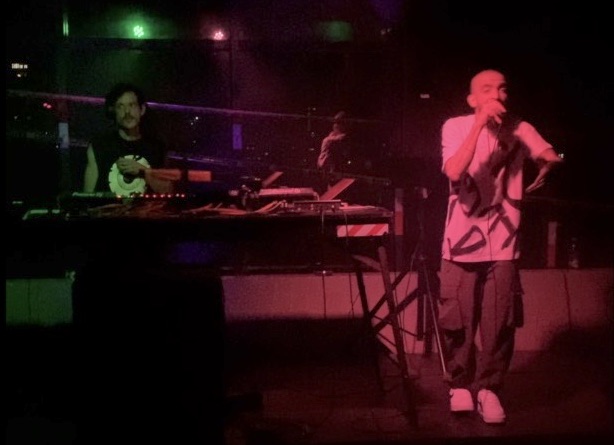
Another collaboration of Frequent Defect and the touring crew was through june as’ appearance at the Recordat takeover of the Gold Room, a hi-fi space tuned to perfection by the 21dB audio team from Jdeideh, in the large-scale club Ballroom Blitz Beirut. The night at Ballroom opened with a live set of Elvin Brandhi to an eager audience that anticipated a more radically-footed music compared to the classic house vibes that entertained the Foyer. Improvising with voice and sampled field recordings through a Roland SP-404 sampler, heavy, non-looping, glitched out auto-tune and fired up shouts are some aspects of her progressive music. Transitioning to Sara Persico through a duo moment, their styles each distinct but complementing each other so finely. Persico’s dulcet voice and whisper is matched with a Kaossilator, sounds mutated and chopped into attitude. Although an avid improvisor this evening she included a sneak peek of a few compositions from her upcoming debut solo EP, to be released from Karlrecords in February 2023. Owais and Persico dj for an hour each, followed by a much-awaited live set from Cairo based producer 3Phaz. His music is coined as Post-Shaabi (folk in Arabic), traditional mid-east rhythms that flow into Footwork or Hard Drum style dance music. He performed a live set from his album Three Phase. It starts with “Dawayer”, meaning circles, on a rhythm which I decipher is a Malfuf, going Dum ka Tek ka Tek, a 2/4 time Egyptian beat, or is it the Wahda Kebira that goes Dum Tek Tek Dum Tek on 8/4… Other tracks like “Exploit” are more like drum n bass, but clearly with the aesthetic of instrumentations of Egyptian traditional. Reading up about mid-east rhythm families, how different rhythms are associated with moves, backwards forwards and circular, the importance of dance is clear. I met while 3Phaz plays, a real belly dancer, but the rest of us are also dancers. The Gold Room is packed comfortably and as a friend I met at Frequent Defect tells me, whenever the crew plays in this room, you can see how the community takes over and becomes entranced with a noticeably different vibe from the rest of the mega club.
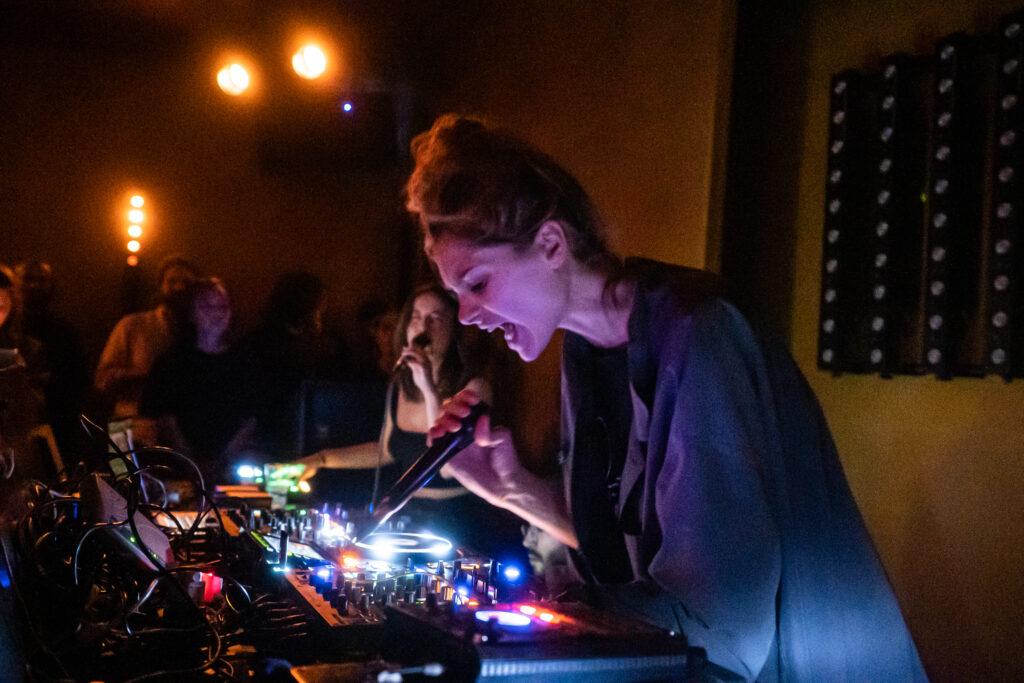
“There’s only twenties and over forties here (in the club),” a local that I briefly exchanged a conversation with at the Gold Room tells me. “Everyone in their thirties, at least those who can, have left the country.” Although our focus is on the sonic layer, it is hardly impossible to ignore the socio-political, religious, and economic layers that create the reality of this city.
The most recent mass migration was triggered by the hyperinflation of the Lebanese Pound (LBP) simmering around 2019 and exploding in the aftermath of the 2020 blast at the Port of Beirut. The economic situation impacted the prices of all imports to rise more than 15 times over. At the time of my visit, a dollar was worth around 40,000 LBP, the lowest yet, while the official bank rate remained pegged at 1,500 LBP. Exchange shops dot the city, frequented by locals and foreigners, and the rates change daily if not hourly. Halfway into my stay, I run out of LBP and return to the exchange shop, confronted with a new rate of 35,000 LBP per Dollar, in the afternoon it dropped some more. There was a 10% fluctuation in a single day. I’m perplexed, understanding just a hint of the disillusion towards money people here face. A piece of paper that has no intrinsic value, Monopoly money (from the game) as one local interviewee phrased it in a documentary on DW. A strong presence of various religious beliefs is felt in Lebanon, but money worship is not one of them. Some music venues like the Metro Al Medina install a ‘pay what you want’ system for the locals, but not all can afford a night out.
Problems snowballed as the increase in prices of imported fuel caused electricity to stop, slowing down the economy further. Sounds of the Quran prayers and low rumble of the electricity generators are ever present on the streets of Beirut. The realization strikes hard when we leave the city for a short outing to the mountains, how much noise pollution we are under the influence of in the urban environment. The silence here speaks for another layer of reality that exists right beside, a place literally above the clouds. Here the moist air from the sea meets the sharp rising terrain and form into clouds, the temperature drops, and cedar trees begin to grow. On our trail, the tranquility is so deafening, that we were able to speak to each other in a normal voice from 50 meters away.
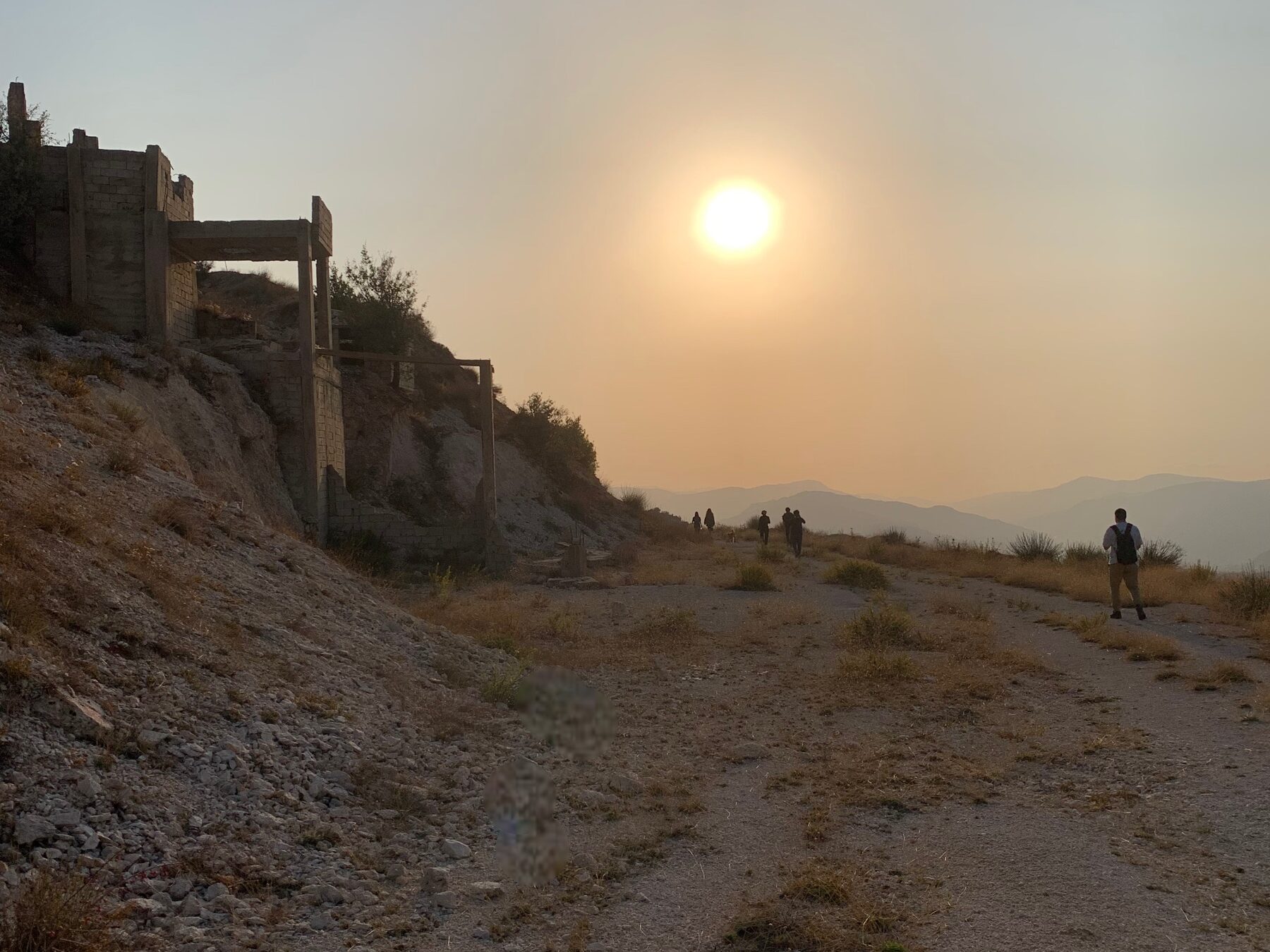
Back in the city, official electricity grids are replaced by a jumble of cables connected to neighborhood generator systems, unregulated and looking hazardous, exhausting fumes that add to the PM and CO emissions from cars. Toxic as it is, this is the system that supports life here. Rhea Dally, a tech-enthusiastic musician and instrument maker, writes me excitedly about the monolithic looking generator that I saw, to tell me that she cannot recall how many times she has recorded that exact massive thing. For Dally, the imagery of a mess of tangled cables next to a big yellow sign reading in bold letters “Allah” (GOD), represents the yearning of peoples’ connection to energy, to power, to the almighty and how messy this dynamic is involving money and historic power balances, allowing only the privileged access to it.




Despite all this chaos or because of it, I met so many creative, industrious, ingenious and warm souls during my stay. We shared deep conversations, and they were the ones that inspired me to write. One for sure was this Rhea Dally, which I met as a collaborator of Elvin Brandhi. Dally invited me over one afternoon, as she tended to her big laptop that was training a program to compose music, the data set being a combination of her own chip tune/8bit music, and Christian hymns sung in Arabic. She plays for me her self-built instrument, a reconstruction of a toy keyboard, fully equipped with stereo outs, oscillators, pitch control, lfo, light sensors and other circuit bending modifications. “Do you like the Thermin?” Dally grins, and shows me how she controls the oscillator with a hover of the hand. The rest of the afternoon we share some Manoushe – a type of flat bread with Zatar, and talk about the future of technology and machine learning, new systems and new consciousnesses to come out of it, which Dally is very optimistic about. Web scraping, the analysis of linguistics, and music being Dally’s areas of speciality, the conversation arrives at researcher Glenn McDonald’s Every Noise at Once website. For me this is a fascinating yet dystopian reality of the music industry today, where machines listen to every sound and crawl words on the web (even websites like mine), to analyze which genre an artist belongs to in order to power the recommendation algorithms, a tool developed to commodify music at the speed of ever accelerating processing power.
I’m fascinated because of the mixed results and reactions by different people, it is definitely a piece of thought, and a conversation starter. When I searched Elvin Brandhi on Every Noise at Once and shared the results on how she is categorized, New Isolationism, “Wow, is that even a genre?” she laughs, but is excited about this term (other things that excites Brandhi is lightning, onomatopoeia and Ashta fruit) and goes on to tell me how her generation, born in the era of YouTube and smartphones, experiences the state of isolation in more of a positive way, it is a natural state, compared to the euphoria of unity at clubs that the older generation might have lived. Deconstructed Club was another genre that hit the search with her music, severed samples and bursts of voice fractured in uncanny auto-tune, patched and glitchy, the term deconstruction sits well with her. On the other hand, 3Phaz’ music was wrongly filed under Mahraganat, a new genre of Egyptian street music raving the streets of Cairo and wedding parties, “but smart,” he nods, because the articles written on his music often mentions the genre, for one articles like this one here.
As a storyteller, I find a need to search for certain patterns, a cohesive theme, segue from one context into another. A music genre is just that sometimes, that bundles up creations and make things more accessible to each other. Sometimes a dj does that, or an event organizer like Frequent Defect. “It’s funny now, since we started doing Grime and Punishment, when people from our surrounding hear something that fits into that night, they would tell me, ‘Oh this is very Grimy’ or ‘that’s very 10hymns’ (from 10 Hymns for Corrosions) ,“ amuses june as. Music genres are fluid and there are no rules. Listen to what you like and call it what you like, the algorithms might be listening but we are the ones creating the reality. Dally is confident, that algorithms have consciousness, because they are an extension of our conscious expressions. So hey computer, if you’re listening, we want peace in Palestine, and no more borders, no more inequalities.


Another topic for the time capsule: On 25th of October, 2022 there was a partial solar eclipse, so Elyse, Rhea, Sanaa and I, rode through town blasting “Total Eclypse of the Heart” by Bonnie Tyler. But here’s an embed of “Chance Meetings” from the Beirut post-punk synth-wave shoe-gaze outfit The Bunny Tylers. What a jam.
Acknowledgements: Thank you to all the loving souls I met on this trip, who welcomed me with open arms to your country and to your world. Not everybody is mentioned or elaborated on as deeply enough due to a lack of knowledge / research on my behalf, lack of space, but I was greatly inspired by their hard work, brave undertakings, and unconditional warmth, and they pushed my back to take a ride (on the back of a hitched motorcycle, that ignores all the traffic rules) to where ever my curiosity leads. Habibi!
